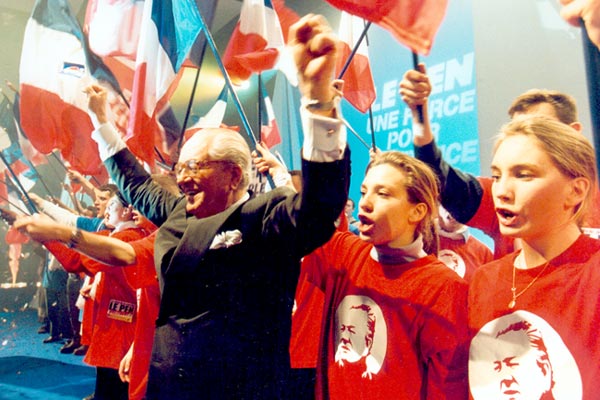|
|
|
|
The Margin Widens
Text : Mikaëlle Montfort, Montreal
|
Much has been written and said of Jean-Marie Le Pen’s performance in the second ballot to the French presidential election as being an upheaval and major political shake up. The ousting of Lionel Jospin, the main leftist social democrat, certainly seemed unimaginable. It is as if the US presidential election were to be played out not between a Republican candidate and a Democrat candidate but between George W. Bush and the political representative of the Ku Klux Klan! |
|
Yet, after the calamity of April 21, 2002, things seemed to return to democratic order. On May 5, left-leaning and republican right-leaning electors cast their ballots (25% of eligible voters did not fill out a ballot) and decidedly (82.21% of votes) backed Jacques Chirac who stood for guaranteeing the values of French democracy. Then, in the June legislative elections, the low number of votes for the Front National, Le Pen’s political party, meant it failed to vote in a single deputy to the National Assembly. It could be tempting to argue that the vote for the extreme right was nothing more than a passing expression of dissent. In reality, however, it would seem that the margin held by the extreme right in France is large. |
 http://www.frontnational.com/multimedias/photos/lepen/dirigeants/pages/01.htm |
|
And, unfortunately, it would seem that this margin is not growing any smaller. It would furthermore seem that the ideas of the French extreme right have infiltrated French society as a whole. These ideas—largely held by the Front National and the Mouvement National Républicain, an offshoot of the former—are equally simplistic and heinous. Officially, these parties advocate a right of nationality founded on blood, no native soil (the “national preference” when it comes to access to work and social benefits), moving foreigners to the borders, leaving the European Union and confining women to the home. Ideologically, these “positions” mostly stem from keeping to the idea of “white racial” supremacy and an ethnic view of Nation. It is public knowledge that Le Pen wrote nazi songs, that he keeps friendships with former SS officers and that he performed torture during the Algerian War. In the speeches of Jean-Marie Le Pen, his hate for Arabs rivals his anti-Semitism. When Le Pen says “France for the French,” how easy it is to also hear “and out with Arabs”! |
|
It bears remembering that Le Pen has the support of certain backers among the “pieds noirs,” French Algerians who had to leave Algeria when it gained independence in 1962. However, these very “pieds noirs” hated the Gaullists (Jacques Chirac being its spiritual embodiment), in so much as they felt betrayed by General de Gaulle who agreed to Algeria’s independence. But the ideas of Le Pen affect a far bigger electorate than that made up of this segment of the “pied noir” population. In total, 5.4 million voters out of 29.5 gave their support to the extreme right (the FN and the MNR) in the first ballot of the French presidential election. On the second ballot, Jean-Marie Le Pen won 5.5 million votes! |
 http://www.frontnational.com/multimedias/photos/lyon2002/index.htm |
|
Thus, the extreme right did not lose any votes between the first and second ballots, and this despite the tremendous pressure put on voters between the two ballots, voters (including leftist voters) who decidedly and unanimously stood against Le Pen, and thus for Jacques Chirac on the second ballot. This is like PQ voters strongly backing the Quebec Liberal Party in order to block the ADQ! Contrary to what has often been said, all right-leaning voters do not belong to “la France d’en bas” [the low-end France] (a catch phrase used to describe any Frenchman afflicted with any type of defect, including poverty, intellectual deficiency, coldness to Europe as well as identity-based and national inklings). When we consider the extreme right’s share of the vote in Paris’ 16th and 8th “arrondissements” (among the richest neighbourhoods in France), we find that the extreme right also attracted the comfortable and highly qualified “France du dessus” [the high-end France]. Thus regardless of living conditions or socio-cultural background, nearly 10% of the French agreed whole-heartedly with the ideas of the extreme right. Even though this is coming to light today, the phenomenon is nothing new. Since 1995, the Front National has never received a share of votes under 15%, regardless of the type of election (presidential in 1995, legislative in 1997, regional in 1998). |
|
|
What is however relatively new is the place given to the ideas cherished by the extreme right in the overall French political arena. The French presidential and legislative election campaigns were carried out under the predominant notion of the fight against rising crime rates. This very “extreme right” notion seems to have become extremely unifying judging the overwhelming UMP (Jacques Chirac’s political party) victory in the legislative elections. It would appear that a majority of Frenchmen are in fact in agreement with two things: that the French are exposed to an unacceptable level of crime and that repressive measures are called for to counteract this reality. |
|
If it were probable that only a small portion of the population living in France is in fact exposed to an unacceptable level of crime, it is nonetheless improbable that a purely repressive arsenal would reduce levels of crime. The simplistic arguments put forward by the traditional political class encourages the spread of extreme right ideas throughout French society. This position, far from discrediting such arguments, runs the risk of giving just little more credibility to right-wing ideas and possibly even to right-wing representatives. The possibility of making a large margin even larger exists, and those who find “solutions” in hating the other maintain the margin. Similarly, holding European summits on the fight against illegal immigration gives credence to the idea already strongly held by many Europeans that immigration is intrinsically bad. And this even though it has been known for some time now that immigration is an economic and demographic necessity for Europe. |